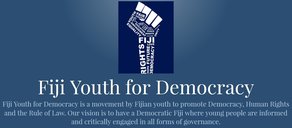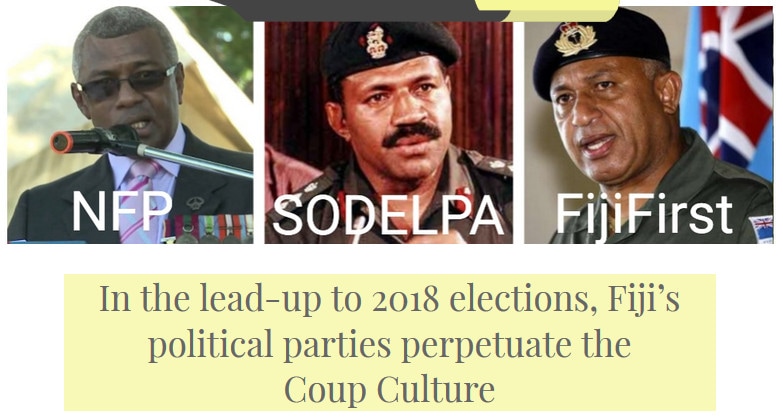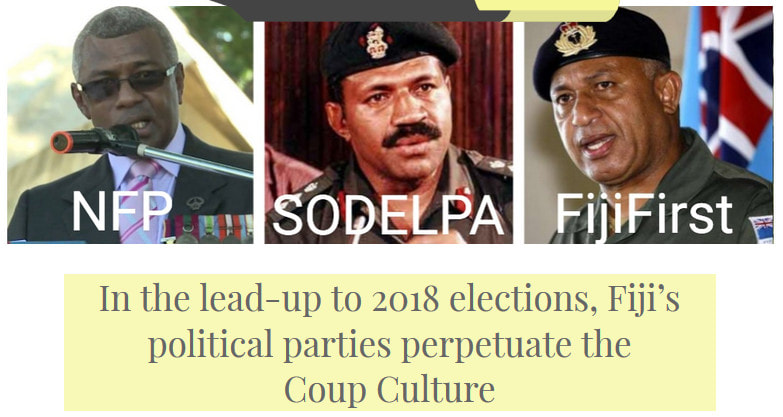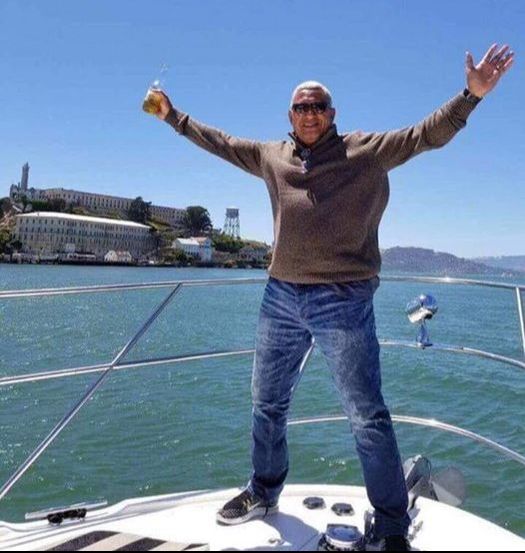Fijileaks: Our highly reliable sources at the barracks claim the scheduled 2018 election could be postponed under pretext of national security; Kalouniwai was directing his warning at NFP president Pio Tikoduadua but it were these two who liu muried Pita Driti, sending him to prison. What is really despicable is Sitiveni Rabuka's sycophants exhorting all and sundry, especially native Fijians, to make this coupist next PM. They refuse to see RABUKA'S EVIL PAST and him as Father of Coup Culture.
A Coup is a Coup!
The Republic of Fiji Military Forces says once again, we are hearing the usual rhetoric coming in different shapes and forms using communal divisions through ethnicity, race and religion to push a specific agenda for political gains.
The RFMF says the National Federation Party President Pio Tikoduadua’s statement that the people’s security lies with the goodwill of all communities particularly the iTaukei cannot go unchallenged, given what the constitution mandates the RFMF which is the overall responsibility to ensure at all times the security, defense and well‑being of Fiji and all Fijians.
RFMF’s Chief of Staff Lt Colonel Jone Kalouniwai says this effort to rebut intends to re‑emphasize the same confidence and trust in the RFMF’s continued relevance as an institution ensuring security in the shaping of our nation’s destiny as it increasingly gains greater stature in the comity of nations.
The RFMF says whilst it continues in its efforts in being apolitical, it will continue to play a pivotal role towards nation building.
It says unfortunately, statements like Pio Tikoduadua’s certainly have the potential of becoming an engine for ethno‑nationalism.
The military says statements as such have the potential of only influencing and breeding suspicion, distrust, ethnic tensions and potentially lead to conflict.
Lt Colonel Kalouniwai says the RFMF today with a renewed spirit of nationhood will continue to play a significant role in fostering the spirit of inclusive growth as enunciated by Government, and always guarantee and ensure that our rights, identity, culture, religion and land are protected, enshrined and safeguarded in our constitution for all times.
Lt Colonel Kalouniwai says this has become even more relevant today in a globalized and interdependent world where nation states are political units in an international system, representing the citizens’ aspirations.
He says the current government’s National Security Strategy a first ever of its kind by any Fijian government, reinforces this responsibility of the People’s Security in a framework that looks at Comprehensive Security.
The RFMF says this framework capitalizes on a whole government approach that would in turn act as an instrument to achieve life, liberty and pursuit of happiness.
It says the process of nation building by the current government aims at the unification of the people within the state so that it remains politically stable and viable in the long run.
The RFMF says the pillars of nation building in this 21st century look towards Security, Justice, Economic Development and a form or process of civil government or constitution.
It says security comes first in the packing order because the other three pillars function effectively only if the security threshold on the nation, both internal and external, remains intact.
The RFMF says their very own National Security Strategy has identified the sustainable well‑being of Fiji and all Fijians at the top of its list of its five identified security priorities for Fiji. In this context, the smooth functioning of democracy brings in its wake social justice and economic development.
Tikoduadua had said at the NFP Convention earlier this month that everyone’s rights is guaranteed in the 2013 constitution and he believes that people’s security lies with the goodwill of all communities particularly the Itaukei.
Tikoduadua said fear and the race card should never be used going into the 2018 general elections.
He said the RFMF should never take any side and should only ensure that everyone is protected.
When contacted today, Tikoduadua said that he has received the RFMF statement and he will reply in due course.
"The elevation of two former senior military officials [Rabuka and Tikoduadua] to leadership positions in the opposition parties raises pertinent questions relating to further militarization of Fiji’s politics as it heads to elections: Do the major political parties now believe the only way to challenge or usurp a coup leader is with another coup leader/ military man? For the voters, do they really think a vote for a military man is a vote for stability -a guarantee to avoid future coups? In the lead up to the 2018 elections, the chances of having any untainted leadership in Fiji’s major political parties have gone slimmer. As a nation, we must ask ourselves as to what leadership we truly desire. For all the rhetoric by the major parties as to the importance of democracy and rule of law, we as critical thinking voters must make a genuine attempt to look beyond mere rhetoric as we strive to work towards a true democracy that is firmly against coup culture."

The recent announcement of Lieutenant-Colonel (Retired) Pio Tikoduadua as the President of the National Federation Party (NFP), an opposition party, is an indication of how deeply ingrained the coup culture has become in Fiji.
This followed the election of Major General (Retired) Sitiveni Rabuka, the instigator of Fiji’s coup culture, as the leader of the Social Democratic Liberal Party (SODELPA) – the leading Opposition party – in June 2016. With FijiFirst, the party in power headed by Rear Admiral (Retired) Voreqe Bainimarama, all three political parties currently represented in Fiji’s parliament now have in leadership positions people with questionable democratic credentials and adherence to the rule of law.
The major choices for the 2018 Elections
This year marks 30 years since Fiji’s first coup and in that period there has only been a total of 6 years and 4 months of civilian-led governments that have won their mandate at the general elections without being led by a former or current coup leader.[i]
Fiji’s coup culture goes beyond its susceptibility to periodic military coups and upheavals. Since the first coup in 1987, people of Fiji from all communities have been affected by coups, however the deeply ingrained coup culture also makes the people suffer to their own detriment.
The coup culture is reflected by how after every coup, their leaders and accomplices evade accountability for their crimes and human rights abuses through immunity clauses (as is the case with Rabuka and Bainimarama) or apologies using traditional practices.
Depending on which community are the supposed beneficiaries of each coup, there is either active participation or deafening silence from influential members of Fiji’s various communities. At the various post-coup polls, coup leaders and their accomplices have been elected to parliament time and time again – symptomatic of how the democratic culture is still not ingrained in Fiji’s populace.
The NFP is Fiji’s oldest surviving political party and in the complex mess that is #Fijipol, it has proudly claimed to have never supported a coup. While in the past they have engaged with ‘reformed coup leaders’ in the interests of democratization, they have never propped up coup leaders or supporters as candidates or executive members of their own party.
Earlier this month, the NFP announced Pio Tikoduadua as its new party president at their annual convention in Lautoka.
Tikoduadua’s rapid rise to the position of party president came within two months of his announcement to join NFP as a party member.
As Tikoduadua came out of retirement during the Easter weekend and declared his new allegiance to NFP, the party leader Professor Biman Prasad attempted to whitewash Tikoduadua’s past and present him as a humble civil servant who was not in Fiji during the December 2006 coup.
This by no means gets Tikoduadua off the hook. There were many civil servants including senior Republic of Fiji Military Force officials who took a principled stance and either resigned prior to, and following the 2006 coup, or were terminated for refusing to follow orders during Bainimarama’s violent crackdown and clean-up campaign.
In 2007, Tikoduadua returned from defense studies in Canberra and was soon appointed Acting Permanent Secretary for Justice. According to leaked diplomatic cables on Wikileaks, Larry Dinger, the US Ambassador to Fiji at the time noted the militarization of the public service with Tikoduadua appointed to the role without having any prior legal training.
Tikoduadua later served as Permanent Secretary in the Office of the Prime Minister from 2008 to 2014 before successfully winning a seat as a FijiFirst candidate and serving as Leader of Government in Parliament and Minister for Infrastructure and Transport. In May 2015, he resigned from Parliament due to ill health.
However two years later, during his Easter resurrection message, Tikoduadua spoke of other reasons for his resignation. He claimed that “nobody’s opinion matters in Fiji, except those of the Prime Minister and the Attorney-General”, a fact many of us have known for over 10 years.
While a person’s right to political participation including their right to change political opinion must be fully supported, we must refrain from elevating coup leaders and their accomplices to party leadership without holding them to account for their coup crimes.
Over in SODELPA, Rabuka has been party leader for 12 months now after ousting Ro Teimumu Kepa and during that period he has been able to slowly build support under his leadership. The latest Tebutt poll show Rabuka and Bainimarama enjoying steady support as the top two preferred choices for Prime Minister in the lead up to 2018 elections.
It remains to be seen how much support Tikoduadua will garner for NFP with his recent appointment as President. If history is any indication, NFP also looks set to see a surge in support now that is also has a former military strongman in leadership.
The promotion of both Rabuka and Tikoduadua also casts doubt on these opposition parties’ commitment to women in political leadership, as both of them now occupy positions previously held by women.[i]
The elevation of two former senior military officials to leadership positions in the opposition parties raises pertinent questions relating to further militarization of Fiji’s politics as it heads to elections:
- Do the major political parties now believe the only way to challenge or usurp a coup leader is with another coup leader/ military man?
- For the voters, do they really think a vote for a military man is a vote for stability -a guarantee to avoid future coups?
For all the rhetoric by the major parties as to the importance of democracy and rule of law, we as critical thinking voters must make a genuine attempt to look beyond mere rhetoric as we strive to work towards a true democracy that is firmly against coup culture.
[i] The Fiji Labour Party (FLP) –was in power for 1 month in 1987 and 1 year from 1999-2000. The Soqosoqo Duavata ni Lewenivanua (SDL) party was in power for 5 years 3 months from 2001-2006.
[ii] The Opposition Leader, Ro Teimumu Kepa has indicated that she does not intend to contest the 2018 elections while the former President of the NFP, Tupou Draunidalo, resigned her post in January 2017. Rabuka’s election to lead SODEPLA had created a rift within SODELPA and did not have the support of Ro Teimumu. Tupou Draunidalo in March 2017 announced her decision to join the proposed H.O.P.E Party
*Kris Prasad is a queer activist and a founding member of Fiji Youth for Democracy. You can follow him on Twitter @Angry_Kpra.
** Romitesh Kant is a democracy and human rights activist and is also one of the founding members of Fiji Youth for Democracy. You can follow him on Twitter @Idealist_Cynic.
DISCLAIMER
The views expressed on this guest blog post are of the authors in their personal capacities and do not represent the views of Fiji Youth for Democracy and any other affiliated organisations or networks.





